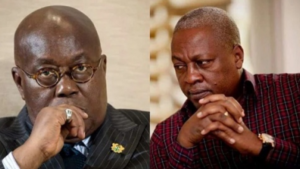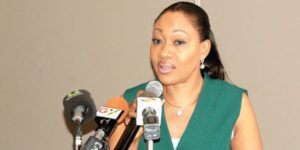…About the financial sector reforms
*Not too late to make a correction, #BringGNBankBack
Story: Atta Kwaku BOADI
The Today Newspaper continues its recall of events leading to the withdrawal of the licenses of
indigenous financial institution. Our purpose is not to engage in a blame game. Rather, we wish
to make the point that it is not too late to reconsider the decision to revoke the licenses.
In October 2018, Dr. Papa Kwesi Nduom hosted an episode of a series labeled “Made In Here”
on ATV (Amansan Television) and several radio stations across the country. He used this
episode to report on a national tour he had embarked on to raise support for indigenous financial
institutions. Nobody listened to him. Not government, not the Bank of Ghana, not the Ministry
of Finance.
Other regulators in the financial sector got into the act also to chase after Ghanaian institutions to
raise additional capital and find liquidity. Instead of finding solutions to sooth the anxiety of
customers, they rather fanned the flames by threatening to revoke the licenses of those who
couldn’t raise the unprecedented increases in capital. Ministers of State, Parliamentarians
stepped into the act and even turned this into a political matter. Shockingly, some so-called
banking and economic “experts” put blinders on even called shareholders of Ghanaian owned
banks thieves and called for their prosecution. We are conducting some research on the role
these “experts” played and will bring our results in due course.
Unfortunately, other Ghanaian owned banks refused to participate in the national crusade to win
the support of Ghanaian citizens to help save local banks. Some were afraid to be tagged as
political players when in reality this was a purely business and economic matter. They didn’t see
the link to jobs. They were hoping that somehow their banks would be saved. A couple were
saved. But the rest went down. Jobs were lost. Ghanaian businesses lost the financial
institutions that had been there for them. This everyone now knows, made the impact of COVID
worse.
Dr. Nduom warned and predicted the collapse of indigenous financial institutions, a takeover by
the state and foreign domination of this critical sector of the economy. He saw trouble ahead for
Ghanaian contractors and business people due to the drying up of credit.
Events in the country since then have proven Dr. Nduom right. Several thousands of jobs have
been lost. Many towns and communities do not have access to safe and secure financial
institutions.
The Today Newspaper has obtained Dr. Nduom’s notes and is happy to bring to you the essence
of the material he presented. At the very beginning of the broadcast, he made it clear that “This
presentation is not political, has no political coloring. It is purely about money and prosperity (or
the lack of it); it is not against foreign banks, rather, it shows a clear preference for local or
indigenous financial institutions.”
Dr. Nduom said, “For one year at least, indigenous financial institutions have been under
pressure from regulators to raise minimum stated capital and to reform; from customers afraid
they would lose their life savings and so have engaged in panic withdrawals; from the collapse of
financial institutions themselves due to any different reasons including self induced problems.
The end result is that about 30-50 billion Ghana Cedis of customer funds – individuals,
companies, government agencies, etc. are at risk. This has needed the attention of stakeholders
to resolve and prevent disaster from occurring.”
“I took it upon myself to become an advocate for this indigenous financial sector to explain the
situation we are in to a cross section of Ghanaians in all ten regions; educate people on what
good investment universal banks do; and ask people to go back and continue to patronize the
services of these institutions especially the indigenous ones knowing how much they mean to the
economy and the development of the nation.
He also used the tour to advocate for the collaboration needed from the stakeholders –
Regulators, Government of Ghana, Customers and Financial Institutions to find a lasting solution
and strengthen the existing institutions.”
One of the first stops Dr. Nduom made was to Abbosey Okai and Agbobloshie in Accra. He
mounted platforms to talk to people who had gathered and also met one on one with spare parts
dealers, onion sellers and many others. Everywhere, there was concern that GN Bank would not
be able to raise its capital to the required level and have to close its doors. The people wondered
what would happen to their deposits if the bank had to close. They complained that the Bank of
Ghana had not informed the people what would happen to deposits if a bank had to
close. Indeed, government officials and the Bank of Ghana did not offer any answers. Only the
repeated threats to close banks who could not raise the additional capital.
During the show, Dr. Nduom noted: “A number of Ghanaians have turned on Ghanaian-owned
banks and painted them all with a bad, negative brush. Worse, some are withdrawing funds from
local banks or refusing to do business with them. It is also Ghanaians who have taken loans and
other credit facilities and failed to pay them back. This includes the government. The resulting
lack of liquidity has brought severe difficulties to these banks. Yet, some perhaps well-meaning
people keep talking down the local banks in favour of the foreign-owned ones.”
What Did Dr. Nduom learn on this national tour?
- GN Bank was not a regular bank. It was a special, national retail bank. It had done what
many older banks such GCB, Barclays, ADB and others could not do. - It was the one in many towns other banks still can’t or don’t want to go. So it developed
a unique clientele who came to rely on it for safe keeping and transfers of their monies.
These towns included: Wecchiaw, Tumu, Wa, Nandom, Nadowli, Gwollu; Tempane, Widana,
Paga, Navrongo, Bolga; Walewale, Savelugu, Karaga, Saboba, Tamale, Yendi; Kintampo, Ejura,
Techiman, Kwame Danso, Wenchi, Chiraa, Goaso; Bogoso, Prestea, Akontombra; Ayanfuri,
Dunkwa, Asebu, Anomabo, Mankessim and many others. - Many small businesses expanded their reach to other towns and regions because GN
Bank offered them the ability for their customers to deposit monies into their accounts
through safe and time saving electronic transfer. - The convenience factor was appreciated by many plus the pride that there is a universal
bank nearby.
Dr. Nduom enumerated factors that should have been considered before the wholesale closing of
financial institutions: - The financial sector in every country is essential for development and wealth creation. It
fuels trade, productive activity and provides the cash flow needed for day to day
living. When interruptions occur, business and social activities tend to hit road
blocks. The confidence of people goes down. Such interruptions have occurred in Ghana
which we must admit it in order to deal with it. - This sector handles public sector payroll, services and and infrastructure works among
others. When the money from the public sector doesn’t come, it affects everybody. This
was a major cause of the liquify challenge. - It fuels the manufacturing, agriculture, mining and other productive activities with
lending facilities and payment services. - The sector stores people’s earnings for safety and growth in value. This depends on
trust. When that trust is broken, confidence in the financial system is shaken and leads to
lack of faith in the formal economy. People resort to even more risky solutions like
“under bed banks” and unlicensed service providers. - The collapse of 7 indigenous banks in the span of 12 months dimmed confidence in the
other ones. Continuous public discussion about who will collapse next instead of how to
support the rest did not help. - The negative speculation fueled by sections of the media using economists, various
analysts and others with no direct stake in the financial sector unnecessarily made some
people to avoid working with the indigenous banks. Panic withdrawals happened and
this caused a liquidity crisis. - Bank of Ghana’s decision to raise the minimum paid up capital from GHS120 million to
400 million made bank management and shareholders to spend time on looking for
money than running the banks. In Ghana, 280 million is a lot of money for several banks
to raise in one year. The consolidation of the five banks in August even narrowed the
funding channels some more. Again, speculation in the media hurt confidence as the
question of who will or will not meet the requirement continued.
- The ordinary person relies on banks for safe keeping and movement of money. For them,
they need the rural banks, savings and loans companies and indigenous banks located
where they live. When rumors of imminent collapse arose, the people became afraid of
the possibility of losing their small life savings and working capital. - Real/perceived governance failures on the part of financial institutions played out daily in
the media painted all indigenous banks with a broad negative brush. Constant replaying
of the weaknesses without presenting those making good effort to play by the rules and
strengthen led to the lose of confidence and inability to raise required capital. - The folding up of micro finance companies, finance houses, investment companies
leading to the loss of savings and investments of many. These companies were locally
owned. All of this played in the minds of the people. So any hint of trouble, led to a run
on all indigenous financial institutions.
Dr. Nduom offered a number of solutions. We present a couple of them:
During US financial crisis, on September 13th 2008, the Banking Regulator (new york fed)
called a meeting of all major bankers and investment banks to figure out if they could save
Lehman Brothers. Lehman filed for Bankruptcy on Sept 15th and signed a deal to be sold to
Barclays on Sept 17th. September 24th, Warren Buffet invested $5 Billion in Goldman Sachs.
So the first point is that the government needed to facilitate meetings amongst the financial and
investment community and provide incentives and regulatory concessions so that local Ghanaian
investors can work together to bail out banks and financial institutions. We don’t have a Warren
Buffett sitting on a huge pile of cash, so we needed non-partisan team work to raise more private
sector cash for the economy
On October 3, 2008, just THREE WEEKS after the bankruptcy of Lehman Brothers, the US law
makers passed the Troubled Asset Relief Program (TARP) because a legal framework was
needed to provide equity funding to banks, insurance companies, auto companies and other. This
is critical.
Dr. Nduom supported a suggestion from an expert that “…legislation should be passed for the
government to lend up to GHS26 billion or 10% of GDP, to local banks and financial institutions
that meet requirements to be specified. There should be a requirement for this money to be on
lent to businesses in key sectors A) Industrialization that reduces imports and increases exports
(rice, chicken, edible oils, tree nuts etc) B) affordable housing (high rise buildings in every
regional capital) C) 1D1F programs etc. So it will solve multiple problems – strengthen
indigenous institutions and fuel industrialization.
In effect, government would provide loans at 5% both to capitalize local banks and to allow the
banks to on lend in key priority areas. There should be peer review at all levels on all loans to
ensure that value is created. this plan will allow the government to accelerate their development
agenda with a transparent, open legal framework behind it. It should include the framework for
open reporting by all banks in Ghana. This is done in the USA. The public will be able to access
the full balance sheet of all banks to see where the money is going.
This is not a bail out. The private sector in Ghana is too small. And every Ghanaian will benefit
from lower interest rates and a better quality of life if government ensures that the loans are
being granted to key priority areas designated by the government. It is a win-win that can
accelerate Ghana’s industrialization and end our reliance on aid.”






One thought on “WHAT“PROPHET NDUOM”FORESAW”
When is the next court date?